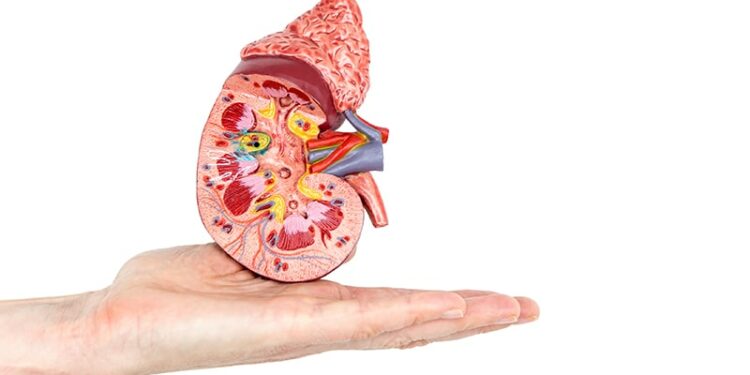[ad_1]
Researchers from Cleveland Clinic in Cleveland have identified a kidney microbiome that plays a role in both kidney health and the formation of kidney stones. Led by Aaron Miller, PhD, and José Agudelo, MD, the study provides strong evidence that the urinary tract is not sterile, with naturally occurring bacterial communities present even in individuals without urological conditions. The findings, published in Nature Communications, have important implications for nephrology, urology, and infectious disease management.
To be considered a true microbiome, bacterial communities must meet specific criteria: Stability, consistency, and reproducibility under different conditions, and metabolic activity. The researchers confirmed all these criteria within the urinary tract, demonstrating that bacteria found in the kidneys are not merely transient or associated with disease. Instead, a stable microbial ecosystem exists within the kidneys, capable of responding to antibiotic treatments and potentially influencing calcium oxalate (CaOx) kidney stone formation.
Potential Clinical Implications
Julia Weinmann-Menke, MD, PhD, director of the Clinic for Nephrology, Rheumatology, and Kidney Transplantation at the University Medical Center Mainz in Mainz, Germany, and spokesperson for the German Society of Nephrology, commented on the study: “The findings — that there is a specific kidney microbiome and that certain bacteria play a role — are certainly interesting and should be further investigated and considered in clinical practice.”
However, Weinmann-Menke added that the study’s findings have no relevance to acute infections. The study does not change the clinical practice for treating infections. Antibiotics are necessary when a patient shows clinical symptoms such as a urinary tract infection, kidney infection, or sepsis, she explained.
Bacterial Growth in Special Chambers
To assess whether the kidney microbiome affects stone formation, the researchers cultured bacteria in special chambers that simulate urinary flow within the kidneys. They then introduced calcium and oxalate, the primary components of CaOx kidney stones.
The uroprotective bacterium Lactobacillus crispatus and a strain of Escherichia coli associated with stone formation were shown to affect the crystallization of CaOx by incorporating CaOx inhibitors and promoters in different ways.
In E coli–cultured chambers, large, stone-like crystalline structures formed. Chemical and x-ray analyses confirmed that these structures were identical to human kidney stones. In chambers where L crispatus grew, no kidney stones formed.
In preclinical models, researchers observed that excessive antibiotic use altered the kidney microbiome, shifting the balance away from beneficial Lactobacillus and toward stone-promoting E coli. This may explain why individuals on long-term antibiotics have a higher risk of developing kidney stones.
Miller and Agudelo also referenced a 2019 study suggesting that gut and urinary microbiome dysbiosis may be a factor in the increasing prevalence of kidney stones. That study highlighted Lactobacillus as a protective factor against kidney stones and Enterobacteriaceae as a pathogenic contributor to kidney stone formation.
Other Kidney Diseases
Miller believes the kidney microbiome’s influence extends beyond kidney stone formation. His team is currently investigating microbial signatures in other kidney diseases and has applied for funding to study genetic variants affecting the kidney microbiome and kidney disease risk across different ethnic groups.
“If bacteria in the urinary tract influence kidney stone formation, they likely play a role in other kidney diseases as well,” Miller stated.
He also stressed the need to move beyond the outdated assumption of urinary tract sterility. “The data consistently confirm bacterial presence in the urinary tract. If we don’t acknowledge this, we won’t be able to develop better treatments and preventive strategies,” he added.
Therapeutic Opportunities
The study findings indicate that antibiotics may interfere with specific enzymes, potentially influencing kidney stone formation. “This could be leveraged therapeutically, particularly in patients prone to calcium oxalate stones,” suggested Weinmann-Menke.
This research challenges traditional views of the urinary tract microbiome and offers new avenues for personalized kidney stone treatments. Further studies are needed to explore microbiome-targeted therapies in nephrology and urology.
This story was translated from Medscape’s German edition using several editorial tools, including AI, as part of the process. Human editors reviewed this content before publication.
[ad_2]
Source link : https://www.medscape.com/viewarticle/think-urinary-tract-sterile-think-again-2025a1000443?src=rss
Author :
Publish date : 2025-02-18 06:01:16
Copyright for syndicated content belongs to the linked Source.














